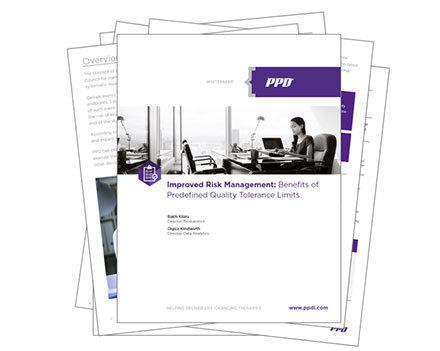
Improved risk management: benefits of predefined quality tolerance limits

Certain events in a study will occur that may impact interpretation of key efficacy or safety endpoints. Establishing appropriate quality tolerance limits (QTLs) can help identify and mitigate the frequency and extent of such event occurrences early. Creating QTLs ensures the early placement of risk mitigation steps to avoid the risk of key study-level parameters or events exceeding the established tolerance limits at the end of the study.
In this white paper, learn how PPD has established a robust and well-integrated, cross-functional process to help its sponsors execute the QTL component of ICH E6 (R2) that includes clinicians, data analytics, statisticians and other disciplines involved in clinical trial design, conduct and final reporting.


To download the white paper, please complete the form below. Fields marked with * are required.